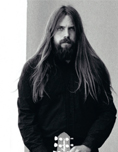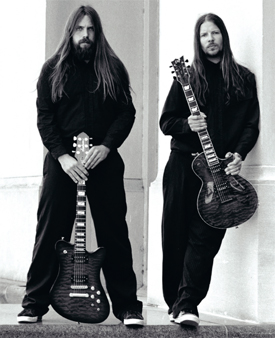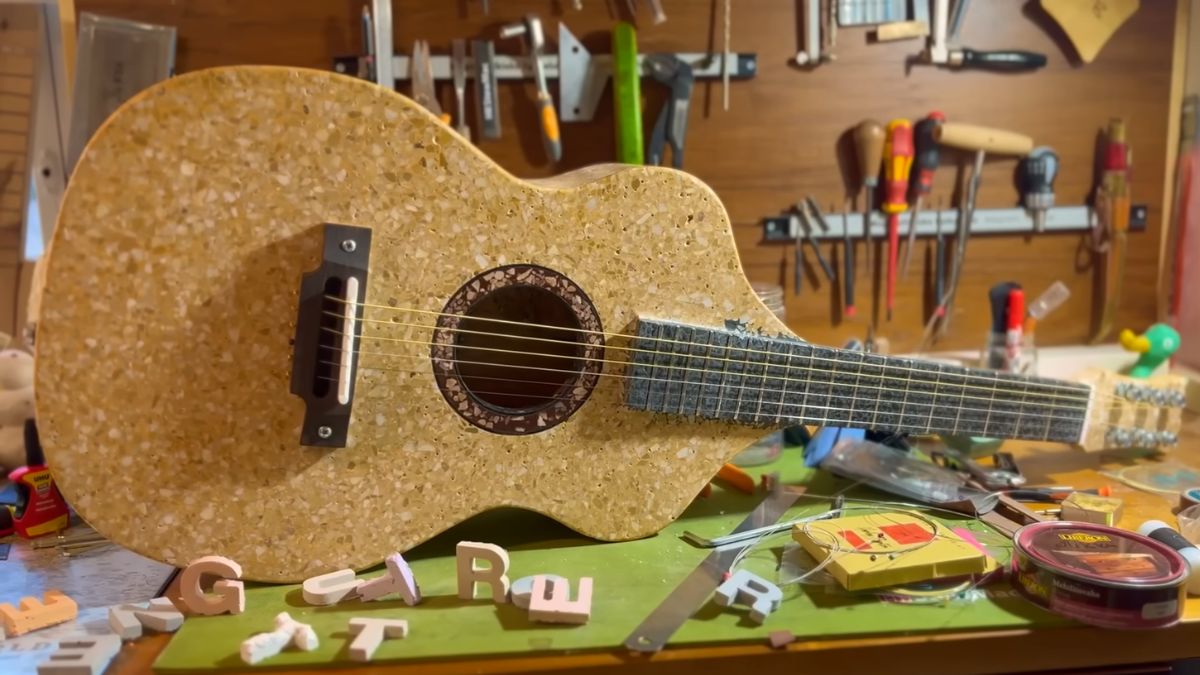The New Guitar Gods: Lamb of God


With Sacrament, the leaders of the underground make their bid for the heavy metal crown.
“We weren’t supposed to be a big band,” says Lamb of God guitarist Mark Morton. “You were never supposed to be interviewing us. You were never supposed to have heard of us.”
Coming from a man whose band just completed an arena tour as the main support act for metal legends Slayer, and whose new album, Sacrament (Epic), is among the most anticipated heavy music releases of the year, this statement rings with more than a hint of false modesty. But perhaps there’s also a bit of truth to Morton’s words: any band that forms under the moniker Burn the Priest, as Lamb of God were called during their first few years, probably isn’t gunning for multi-Platinum glory. As Morton explains, their aspirations in those days were hardly grand. “We were the guys who would show up at your house and play your basement party for 50 bucks and some beer,” he says. “We’d play for spaghetti.”
But if the members of Lamb of God did not have particularly lofty career goals when they first came together in Richmond, Virginia, in the early Nineties, they have always been plenty ambitious when it comes to the music they create. Over the course of three full-length albums (in addition to one when they were still known as Burn the Priest) the band—Morton, coguitarist Willie Adler, drummer (and Willie’s brother) Chris Adler, bassist John Campbell and singer Randy Blythe—have forged a sound that is equal parts heavy metal thunder and hardcore aggression, colored with bits of atonal noise, dissonance and other abrasive elements, and performed with jawdropping instrumental proficiency. The resulting music is among the most visceral, dynamic and technically stunning in current metal. Morton may insist that the band members have always been more than happy to perform for a warm meal and a cold beer. Yet, Lamb of God’s dedication to creating consistently challenging music—as well as their tireless touring schedule and an intense practice regimen that, to this day, finds them rehearsing often five days a week—makes clear that their success is not only well deserved but was on some level perhaps inevitable.
“This band is pretty much all we do,” says Willie Adler. “We’ll get off the road and take a couple of weeks to ourselves, and then it’s either getting together for songwriting, rehearsing for an album or tour, or hitting the studio to begin recording. The music is everything. It doesn’t stop. We never stop.”
Since Lamb of God released their Prosthetic Records debut, New American Gospel, in 2000, things have indeed been moving full speed ahead for them. Alongside bands like Shadows Fall and Killswitch Engage, they were heralded as a leading light in the heavy music resurgence that has been tagged the New Wave of American Heavy Metal. Prior to recording 2004’s Ashes of the Wake, they signed to a major label, Epic. On the road, they headlined last year’s inaugural Sounds of the Underground package tour and participated in the Unholy Alliance jaunt with Slayer (up next: the Megadeth-led Gigantour festival). Clearly, the band has been experiencing one high point after another. Morton remembers one instance in particular where he became aware of this fact: “We were on the Ozzfest tour in 2004, and all of a sudden it hit me that I was playing on the same bill every day with guitarists like Zakk Wylde and bands like Black Sabbath. It’s times like that where you just go, ‘Huh?’ ”
Realizing that his heroes had become his peers could have been a triumphant declaration of arrival for Morton, but the impact had quite a different effect on him. “The last thing you can do when you reach a point like that is sit back and relax,” he says. “Our thing is to always get better and keep pushing forward. Otherwise, you’ll get left behind.”
Get The Pick Newsletter
All the latest guitar news, interviews, lessons, reviews, deals and more, direct to your inbox!
As a result, after more than a decade together, Lamb of God now find themselves in the enviable position of having the entire metal world eagerly awaiting their next move. And that move, if Sacrament is any indication, appears to be a full-on bid for the heavy metal crown. The album’s 11 tracks reveal a marked progression in the band’s writing and arranging skills. The song structures are considerably streamlined, the verses and choruses are more developed, the riffs are not quite as knotty, and the overall sound of the record, courtesy of producer Machine (who also helmed Ashes), is more layered and varied. Even Blythe’s vocals, still characterized by a sandpapery bark, have added depth, and are at times multitracked to effect a massive roar.
And while the band’s trademark thrashy workouts are well represented in tracks like “Beating on Death’s Door” and the scathing “Forgotten (Lost Souls),” on which Morton and Adler’s acrobatic, rapid-fire riffs sprint in lock-step tandem with Chris Adler’s persistent double-bass drum patterns, Sacrament is also the most diverse batch of songs Lamb of God have recorded to date. One track in particular, a moody midtempo number called “Descending”—by no means a ballad, but arguably the slowest song in the band’s catalog—was such a radical departure from the band’s usual sound that Adler admits to having had reservations about including it on the album.
“Mark brought that one in, and from the get-go I did not want to even give it a shot,” he says. “It was so different from anything we had done in the past. It just didn’t seem ‘metal’ to me. I didn’t quite get it, and I thought there was no way it would make the final cut. But once I heard the finished product, I loved it.”
It’s these moments—and there are plenty of them on Sacrament—in which Lamb of God truly shine. The band’s best-known songs, such as “Ruin” (from 2003’s As the Palaces Burn) and “Black Label” (New American Gospel), have always been those that put on proud display their ability to perform extreme music with fierce precision and agility. But on Sacrament, it is the songs that feature their best songwriting that look to be the standout cuts. The album’s first single, “Redneck,” is an uptempo tune that features a slippery, uncluttered main riff and a hooky chorus. The song rocks rather than thrashes, with a rhythm that swings rather than pummels. “It has a bit of a looser swagger than we’re known for,” says Morton. “It’s just a fun song, both to play and to listen to.”
That said, the band also recognizes that there are those fans for whom even the slightest deviation in musical direction is interpreted as the severest of betrayals. While not quite as radically different as “Descending,” “Redneck” has already stirred up chatter among fans as to whether Lamb of God may be heading in a more commercial direction—as commercial, that is, as a song based around the refrain “This is a motherfucking invitation…” can possibly be. “There are some people who think the song isn’t heavy enough, or that Randy doesn’t scream enough. They’re pissed that he’s actually singing!” says Adler. “But there are always those fans that want to keep you in their back pocket. So maybe they’re not going to be into our trying different things, but we need to follow our instincts. And for the most part the response has been incredibly positive.”
“Our goal with Sacrament was to make a record that takes the listener different places,” says Morton. “We wanted to prove to everyone, and also to ourselves, that while we are a heavy metal band, there are no limits to what we’re capable of accomplishing.”
For the new album, Lamb of God were afforded a relaxed timetable in which to create. It was a far cry from the recording process for Ashes of the Wake, during which Epic, eager to capitalize on their new signing (or perhaps anxious to determine if the pairing of major label and extreme metal would result in disaster), pressured the band to rush out a product. Sacrament’s unhurried schedule gave the band members, all of whom contribute to the writing process, liberty to explore ideas to a greater degree. “On the last record we were really under the gun, so we probably wouldn’t have even bothered with songs like ‘Redneck’ or ‘Descending,’ ” says Morton. “But this time we felt we could take some chances, because we knew that if something didn’t suit the band we simply wouldn’t use it. In the end, we were able to incorporate a lot of different sounds into the songs.”
And some of those sounds are indeed different. The guitarists appear ill at ease with discussing the, albeit sparingly employed, keyboards and orchestration on Sacrament, but in the few instances where these sounds are audible, the effect is dramatic. On the leadoff track, “Walk with Me in Hell,” a snaking single-note guitar line weaves in and out of an ominous drone to create a beautifully ethereal sound, while on “Again We Rise,” a blastbeat-style drum pattern and Blythe’s caustic vocal come together with an atmospheric keyboard pad in a chorus that sounds channeled straight from Scandinavia.
“I’ll admit that at first I was like, ‘We cannot have fucking keyboards on our record!’ ” says Adler. “It was a touchy subject. But the few moments where they are there only serve to add depth to the sound. It didn’t bum me out when I heard the final mix.”
“There are a lot of little subsonic touches going on that function to add mass to the songs,” adds Morton. “As a result, the record has a more dynamic sound, but without sacrificing any of the aggression. I think it really adds to the whole thing.”
Morton and Adler were equally open minded when it came to their guitar parts. The two composed some of their most hardhitting and inventive riffs for Sacrament, while also being conscious of playing in the service of the song, something that they had not always done in the past. “There have been a number of times where Willie and I have had to stop what we’re doing and say, ‘Is this a song we’re writing, or is it a guitar clinic?’ ” says Morton. “You start going off on these tangents, stringing all these crazy riffs together, and you lose sight of your goal. We have to remember that 98 percent of our audience does not play guitar or drums. It’s important for us to push the limits of our abilities as players, but we also have to keep in mind that the song is what’s most important.”
The two guitarists recorded their parts at Sound of Music studios in Richmond; the drums had been tracked previously in New York, while Blythe added his vocals last, working with Machine at the producer’s studio, the Machine Shop, in New Jersey. Morton employed a variety of guitars at the sessions, including his “worn-out” 1975 Les Paul Goldtop, a Jackson Swee-tone and his new Jackson signature guitar, a short-scale model based on the Swee-tone body design. Adler, who has for much of his career been associated with Framus guitars, recently began a relationship with ESP and used the company’s Eclipse Custom model to track his parts on Sacrament. The two guitarists recorded their parts direct, using Line 6’s Amp Farm plug-in, and then “reamped” the tracks with a variety of amplifiers, including a Mesa/Boogie Mark IV, a Mesa/Boogie Stiletto and an Orange, as well as a SansAmp. Two basic rhythm tracks were recorded for each song, panned to the left and right, with the guitarist who wrote the riffs playing both passes. “It’s easier that way,” says Adler. “So on ‘Redneck,’ which Mark brought in, he recorded all the riffs, while everything on, say, ‘Again We Rise,’ is my guitar.”
“It’s not really necessary to do more than a few rhythm tracks per song,” adds Morton. “Sometimes too many guitars can have the effect of taking away from the mass. They muddy up the clarity, or cancel each other out.”
Both guitarists added various fills and overdubs to the tracks, with the majority of the traditional solos being handled by Morton. “Willie takes the lead of ‘Forgotten,’ but I think I did all the others,” he says. “We very deliberately tried to include more solos on this one. Rather than come up with some little riff or arrangement, we were just like, ‘Fuck it, let’s put a solo here.’ We didn’t want to be timid about it.”
“We didn’t hold anything back on this record,” sums up Adler. “Maybe sometimes we had to keep ourselves in check and not step too far out, but the bottom line is that we’re always growing as individual musicians and also as a band. The dynamics within the group are constantly changing, and this record is a snapshot of where we’re at right now. It really is a statement of who we are.” Sacrament is quite a statement, one that Adler confidently calls the band’s “best work.” And while the guitarists recognize that, major labels and arena tours aside, playing extreme metal for a living is not exactly the best path to mainstream success—“We ain’t Linkin Park, that’s for sure,” says Morton— Sacrament may very well be the album that transforms Lamb of God from “big metal band” to just plain big.
Which is all well and good, but not, says Morton, the ultimate goal. “We appreciate everything that has happened to us, but first and foremost we’re in this to be musicians and to be creative. Hearing thousands of people scream your songs back at you in an arena is not something we take for granted, but we talk about our earliest gigs the same way we talk about playing Ozzfest. It’s all equally significant. Just the fact that the five of us get to play music together for a living is enough.”
“It’s the best job in the world,” adds Adler. “It’s not exactly glamorous, and it’s not always easy, but it sure as hell beats any other job I’ve ever had.”
“The main acoustic is a $100 Fender – the strings were super-old and dusty. We hate new strings!” Meet Great Grandpa, the unpredictable indie rockers making epic anthems with cheap acoustics – and recording guitars like a Queens of the Stone Age drummer
“You can almost hear the music in your head when looking at these photos”: How legendary photographer Jim Marshall captured the essence of the Grateful Dead and documented the rise of the ultimate jam band










